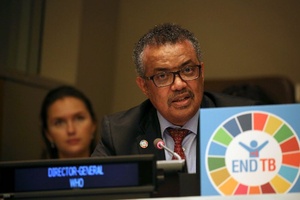WHO Director-General calls for urgent country action to meet End TB targets
WHO Director-General calls for urgent country action to meet UN High-Level Meeting on TB targets in letters to Heads of State.
31 July 2019 | Geneva: The World Health Organization (WHO)
Director-General Dr Tedros Adhanom Ghebreyesus has written to
Heads of State of 48 high TB burden countries urging an
acceleration of country action to meet End TB targets, including
the new targets set at the United Nations General Assembly
High-Level Meeting on the fight against TB. Acknowledging the
commitments and efforts made by these countries towards ending
TB, Dr Tedros emphasized that strong and visionary leadership is
needed now more than ever to drive progress in high burden
countries, and to end the suffering and death caused by this
preventable and curable disease. The Director-General also
encouraged Heads of State to establish national multisectoral
accountability mechanisms under the leadership of the Heads of
State with active involvement of communities and stakeholders,
and in line with the WHO Multisectoral Accountability Framework
launched in May 2019.
The new targets for 2022
are: (1) to provide appropriate diagnosis and treatment to 40
million people with TB, including 3.5 million children and 1.5
million people with drug-resistant TB; (2) to reach at least 30
million people with preventive treatment, including 4 million
children under the age of five, 6 million people living with HIV
and 20 million other household contacts of people affected by
TB; (3) to mobilize US$13 billion annually needed by 2022 for
implementation; and, (4) to mobilize US$ 2 billion annually for
TB research and innovation.
“The bold targets
in the political declaration of the UN High Level Meeting are
intended to galvanise much-needed national and global action to
end the TB epidemic,” said Dr Tereza Kasaeva, Director of
WHO’s Global TB Programme. “This is why the letters
sent by our Director-General Dr Tedros to Heads of State are
important to keep the spotlight on promises made to
accelerate the TB response. It is critical now more than ever to
keep the foot on the pedal, national and sub-national targets
will help drive a united response at all levels saving millions
from suffering and death”.
To deliver on these
commitments, WHO is currently working closely with Stop TB
Partnership and the Global Fund to coordinate with
countries, partners, civil society and other stakeholders
to support national programmes in planning and
implementing actions towards reaching the 2022 targets and
beyond.
“We have a collective responsibility to
reach the UNHLM targets by the end of 2022. Everyone has their
part to do and every country has a number of people with TB to
be diagnosed and treated if we want to reach the global targets.
This is why we at Stop TB, using the WHO latest available data
and working with Avenir Institute Model developed country based
indicative targets that can be used for the NSPs as well as
funding requests. We will be able to end TB only
together,” said Dr Lucica Ditiu, Executive Director of the
Stop TB Partnership.
High TB burden countries should
urgently translate global targets into national targets, the
indicative targets developed by the Stop TB Partnership can help
in this regard.
Mr Peter Sands, Executive
Director, the Global Fund to Fight AIDS, Tuberculosis and
Malaria, emphasized, “The UN High-Level Meeting in 2018
demonstrated much greater political commitment to tackling TB,
but now we need to deliver. We urgently need increased
international funding to fight TB, and increased domestic
resource mobilization. Together we must step up the fight to
diagnose and cure the millions currently being left untreated,
and to counter the threat of drug-resistant TB. We can only
reach the goal of ending TB as an epidemic by 2030 if we act
now.”
The WHO Director-General is working
in close collaboration with the United Nations Secretary-General
to provide a global report on progress towards ending TB in
2020. This report will inform a comprehensive review by Heads of
State and Government at a high-level meeting in 2023.
Source:
WHO


